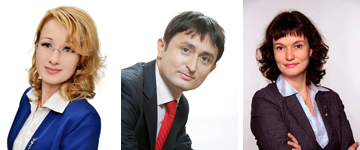Abstract
Some theoretical and methodological aspects of the use of modern information and communication technologies (ICT) in foreign language education for the "third age" learners are analyzed. The global trend of life-long learning and the development of universities of the "third age" are discussed. Contradictions related to scientific and methodological support of modern ICT in foreign language education for the “third age" learners are outlined. Brief analysis of recent research and publications on the above mentioned issues is offered. Theoretical framework and methods of the research, with a participatory approach as a basis, are described. Content of the foreign language education for the "third age" learners within the conducted research is specified. Results of the research are summarized, methodological recommendations are given and the prospects for further research are outlined.References
Oliynyk O. M. “Сonceptualization of glocalization: methodological aspects”. 2009 Humanitarian Bulletin ZGIA, No. 38, 2009. [online]. Available: http://www.zgia.zp.ua/gazeta/VISNIK_38_4.pdf – accessed 10.19.2017Accessed on: October 10, 2017(in Ukrainian)
Kholostova E. I. Social work with the elderly . Evdokiya Ivanovna Kholostova. Teaching guide. 2nd ed. M .: Publishing and trading corporation "Dashkov and K", 2003.(in Ukrainian)
Zvereva I. D. Social work in Ukraine . I. D. Zvereva. K .: Center for Educational Literature, 2006.(in Ukrainian)
Yakubova L. A. “Comparative analysis of peculiarities of adult social work organization in Ukraine and abroad”.Scientific Bulletin of UzhgorodUniversity : series : Pedagogy. Social work. Uzhhorod : Publishing House UzhNU "Hoverla", 2015. p. 210-211(in Ukrainian)
Lukyanova L. “Leading features of adult education”.Adult education: theory, experience, perspectives. - 2009. p. 72-80. [online]. Available: http://nbuv.gov.ua/UJRN/OD_2009_1_11.Accessed on: October 10, 2017(in Ukrainian)
Pavlova Y. "Lifelong learning" principle as an essential condition for the preservation and strengthening of the health of seniors (by the example of universities of the third age)”.Young sports science of Ukraine. 2013. p. 117-123. (in Ukrainian)
Barkowski H., Krumm H.-J.Fachlexikon Deutsch als Fremd- und Zweitsprache. Tübingen, Basel: A. Franke Verlag, 2010 - 370 s. (in German)
Feltsan I. M. "Modern adult foreign-language education: content aspect".Bulletin of Cherkasy University. Series: Pedagogical sciences 12. 2016.p. 135-141.(in Ukrainian)
Motherhood in childhood [online]. Available: http://www.unfpa.org/sites/default/files/pub-pdf/RU-SWOP2013_0.pdfAccessed on: October 10, 2017(in English)
Population. [online]. Available: http://www.ukrstat.gov.ua/operativ/operativ2007/ds/nas_rik/nas_u/nas_rik_u.html Accessed on: October 10, 2017(in Ukrainian)
"European standards of the pension system as a particular factor for socio-economic aspects in Ukraine". [online]. Available: http://azov-academy.ucoz.org/publ/stati_i_nauchnye_publikacii_articles_science/evropejski_standarti_pensijnoji_sistemi_jak_viznachalni_chinniki_formuvannja_socialnoji_sferi_v_ukrajini_r_p_luckij/1-1-0-112. Accessed on: October 10, 2017(in Ukrainian)
"National Action Plan for Positive Ageing" [online]. Available: http://spo.fpsu.org.ua/reaguvannya/3198-spo-ob-ednan-profspilok-pro-proekt-rozporyadzhennya-kmu-pro-skhvalennya-strategiji-natsionalnogo-planu-dij-z-pitan- starinnya-do-2022-hand. (in Ukrainian)
"Overcoming information inequality" [online]. Available:http://nbuviap.gov.ua/index.php?option=com_content&view=article&id=1898:podolannya-informatsijnoji-nerivnosti-3&catid=71&Itemid=382. Accessed on: October 10, 2017(in Ukrainian)
Fedorenko S. A. “Universities of the "third age" as a component of continuous education; foreign Experience”.Pedagogical process: Theory and practice. 2014. p. 133-138.(in Ukrainian)
Savelchuk I. B.“Innovative methods of social work with the elderly: specificity and peculiarities of implementation”.Young Scientist. 2015. 2 (17). p. 95-98.(in Ukrainian)
Skoryk T. V. “Social and pedagogical effect of the third age university”. Young scientist. 2015. 2 (17). p. 117-123.(in Ukrainian)
"IDEA-UKRAINE" [online]. Available: http://idea-ukraine.ph-int.org. Accessed on: October 10, 2017(in Ukrainian)
Auerbach E. Making Meaning, Making Change: A Guide to Participatory Curriculum Development for Adult ESL and Family Literacy. University of Massachusetts, English Family Literacy Project. 1990. 252 p.(in English)
Freire P., Pedagogy of the oppressed. New York: Continuum, 2006. 183 p.(in English)
"The model of educational environment for elderly people in the context of lifelong education" [online]. Available: http://194.44.152.155/elib/local/2348.pdf Accessed on: October 10, 2017(in English)
"Training courses" [online]. Available: http://idea-ukraine.ph-int.org/studyAccessed on: October 10, 2017(in Ukrainian)
Authors who publish in this journal agree to the following terms:
- Authors hold copyright immediately after publication of their works and retain publishing rights without any restrictions.
- The copyright commencement date complies the publication date of the issue, where the article is included in.
Content Licensing
- Authors grant the journal a right of the first publication of the work under a Creative Commons Attribution-NonCommercial-ShareAlike 4.0 International License (CC BY-NC-SA 4.0) that allows others freely to read, download, copy and print submissions, search content and link to published articles, disseminate their full text and use them for any legitimate non-commercial purposes (i.e. educational or scientific) with the mandatory reference to the article’s authors and initial publication in this journal.
- Original published articles cannot be used by users (exept authors) for commercial purposes or distributed by third-party intermediary organizations for a fee.
Deposit Policy
- Authors are permitted and encouraged to post their work online (e.g., in institutional repositories or on their website) during the editorial process, as it can lead to productive exchanges, as well as earlier and greater citation of published work (see this journal’s registered deposit policy at Sherpa/Romeo directory).
- Authors are able to enter into separate, additional contractual arrangements for the non-exclusive distribution of the journal's published version of the work (e.g., post it to an institutional repository or publish it in a book), with an acknowledgement of its initial publication in this journal.
- Post-print (post-refereeing manuscript version) and publisher's PDF-version self-archiving is allowed.
- Archiving the pre-print (pre-refereeing manuscript version) not allowed.


